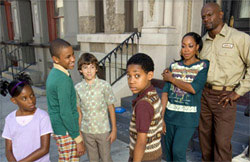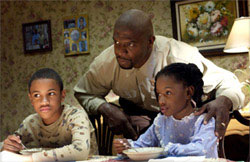February 27, 2006
FeatureLearning to Love Hate
A sitcom finds its voice through heaping on the misery.
 |
After a pretty successful launch — it beat Joey its first time out — Chris has struggled to keep its audience. For fans of Rock, and high-minded TV fans in general, the show in its early outings didn't do quite enough to set it apart from your standard nuclear family sitcom. As the season has rolled on, the comedy has hit upon more and more of an original voice, although it remains to be seen if the ratings numbers will ever be as good again.
Even with reduced numbers Everybody Hates Chris is still what passes for a hit on the soon-to-be defunct UPN network, so the show has had some time to grow into itself. It's true that mother Rochelle (Tichina Arnold) and little siblings Tanya and Drew (Imani Hakim and Tequan Richmond) have yet to really sprout dimension beyond their obvious Cosbyverse precursors. But as LeRoi and his staff have gone along, they've developed a storytelling voice that transcends the show's perhaps-too-specific milieu and recalls some of the most fondly-remembered television depictions of childhood ever aired — the classic early Charlie Brown holiday specials.
| Their references to the touchstone moments of the timeless specials... are all meant to momentarily evoke through allusion a feeling that none of the newer shows generate internally. |
Everybody Hates Chris ,when it's working, generates all-new childhood misery. Tyler James Williams is relentlessly appealing as the title character, but the show steadfastly refuses to make life in any way easy for Chris. Standard plots involve the hero's bike being stolen, his class-photo day outfit going missing, his crush abandoning him for his younger brother, and his crashing and burning with the school basketball team. In one of the best episodes to date, "Everybody Hates a Part-Time Job," Chris both learns the agonizing value of a dollar and the humanity of his own father.
 |
Obviously the show is at its best when it plays its two strongest characters off of each other, as in "Everybody Hates Christmas" (well, what do you know — a holiday episode). In this show a broken hot water heater has left Julius and Rochelle without enough cash to buy all the kids presents. Chris, who deeply desires a new Walkman, is left to learn in short order that there's no Santa and that this year, for him there's no Christmas. LeRoi and episode co-writer Alyson Fouse steadfastly refuse to resort to a deus ex machina. No mysterious benefactor emerges at the last minute, and Chris has to go without his Walkman. Even in this day and age, that's a pretty gutsy stance for a family sitcom to take.
The show still has a way to go. Chris seems to have painted itself into a bit of a corner with its early-1980's setting; the writers seem to feel it necessary to insert a "period" element into every plot like That 70's Show in its first season. The show seems a little overly cautious when it comes to race issues, particularly in the relationship between Chris and his white best friend Greg (Vincent Martella), who ironically seems more at home with black culture than Chris is. Too often the Chris writers pick a gag so obvious that it can't possibly come across as offensive: the rich, older black man who rents the room upstairs turns out to be a wanted criminal, or Chris ends up posing for his school picture in a lawn jockey's outfit. It'd be nice to see more scenes like the one at the close of "Everybody Hates Greg," where the initially distrustful Julius and Greg's dad bond over a beer. Another area that needs improvement is the writing for the brother and sister characters. Tanya to this point is just a stock whiny little sister, and while Richmond is well-cast as the kid to whom everything comes easy in opposition to Chris, he could use some more to do.
| The title itself is one of the show's weakest links, inadvertently recalling a Simpsons joke about the creative bankruptcy of modern network programming. |
Email the author.
Return to Season 2, Episode 11.
All written content © 2005-2006 by the authors. For more information, contact homer@smrt-tv.com
